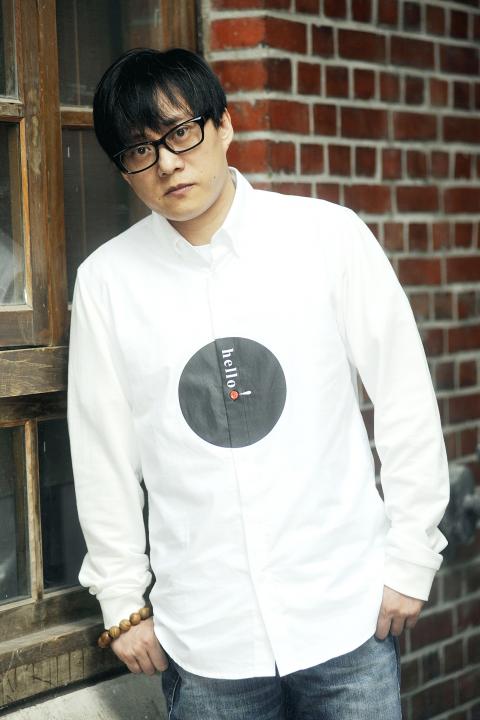Hsinchu City’s Cultural Affairs Bureau held a seminar at the Image Museum on July 25, inviting Albert Leung, known as “Asia’s god of lyrics,” to speak about his creative concepts. Leung told the audience that imagination and real-life experience are both indispensable. If imagination is the only thing, there will be no sense of resonance, so you need to have a grounding in reality.
Leung, a well-known lyricist based in Hong Kong, has written more than 3,000 songs, including Faye Wong’s Adzuki Beans, Eason Chen’s Ten Years and many other popular songs that have touched people’s hearts.
Hsinchu is also nicknamed “the windy city,” and Leung said that wind is romantic. At the outset of the creative process, he said, at the superficial stage, before any thought is given to humanistic concerns or social perspectives, lyrics are written for pure beauty. Then when the lyricist goes through the ups and downs of life, acute sensibility becomes essential for creativity, as if time leaves its marks as it crawls across the writer’s skin.

Photo copied by Chao Shih-hsun, Taipei Times
照片:自由時報記者趙世勳攝
Leung also remarked that words are carriers and sometimes they are metaphors. A lyricist does not necessarily have to experience what he or she intends to put in writing in order to write about it, because the most important thing is feelings — whether the lyricist has feelings deep within. For example, Leung has written about the Northern Lights without ever having been to the North Pole. After all, 2,000 of his more than 3,000 song lyrics are about love; how could he possibly have experienced so many love affairs?
Leung’s humorous and thought-provoking discourse was met with zealous applause and laughter from the audience.
(Liberty Times, translated by Ethan Zhan)
新竹市文化局昨在影像博物館舉辦座談會,邀請有亞洲詞神之稱的林夕暢談創作理念。林夕與觀眾分享說,想像力與真實體驗缺一不可,光有想像,是沒有共鳴感的,必須有現實土壤。
香港樂壇知名填詞人林夕,作品逾三千首,如王菲的〈紅豆〉、陳奕迅的〈十年〉等許多膾炙人口的歌曲,觸動人心。
新竹又名風城,林夕說,風是浪漫的,創作最初,在人文關懷、社會觀察之前的風花雪月階段,是單純美感,然後再歷經生命錘煉,敏銳的感受對創作是必須的,彷彿時間曾爬過他的皮膚。
林夕也說,文字是種載體,有時是比喻,所描述的不一定要親身經歷,最重要的是感覺、內心有無感情,正如他寫過北極光,卻沒去過北極,否則填詞的三千多首作品當中有二千首是關於愛情,他怎可能經歷那麼多段感情。
幽默而發人深思的談話,獲得現場觀眾以掌聲與笑聲熱情回應。
〔自由時報記者傅潮標〕

The Dutch introduced the Indian mango (Mangifera indica) to Taiwan in the 17th century. It is a green-skinned mango with thick fibers that get stuck in the teeth, but it boasts a rich aroma and a unique taste. In 1954, Taiwan’s Council of Agriculture introduced several mango cultivars from Florida, USA, including the Irwin, Haden, and Keitt varieties. After seven years of testing and domestication, the Irwin variety was chosen for promotion. Years later, the sample saplings started to bear fruit. These mangoes were large, with thin, vibrant red peels and golden pulp. The Irwin mangoes were mouth-wateringly sweet and

對話 Dialogue 清清:今天中午我要多吃一點,不然晚上可能會吃不飽。 Qīngqing: Jīntiān zhōngwǔ wǒ yào duō chī yìdiǎn, bùrán wǎnshàng kěnéng huì chībùbǎo. 華華:怎麼了?為什麼會吃不飽? Huáhua: Zěnmele? Wèishénme huì chībùbǎo? 清清:今天大年初七,是「人日節」,傳統上結了婚的女兒要回家給父母送長壽麵,而且最好是素的,我姐姐會回來,只吃素麵,我應該很快就餓了。 Qīngqing: Jīntiān Dànián chūqī, shì “Rénrì jié,” chuántǒng shàng jiéle hūn de nǚ’ér yào huíjiā gěi fùmǔ sòng chángshòumiàn, érqiě zuìhǎo shì sù de, wǒ jiějie huì huílái, zhǐ chī sùmiàn, wǒ yīnggāi hěn kuài jiù èle. 華華:我還是第一次聽說有「人日節」呢!這是怎麼來的啊? Huáhua: Wǒ háishì dì yī cì tīngshuō yǒu “Rénrì jié” ne! Zhè shì zěnme lái de a? 清清:老一輩的人說,女媧是在第七天造出了「人」,所以今天可說是我們每個人的「生日」呢!生日快樂! Qīngqing: Lǎoyíbèi de rén shuō, Nǚwā shì zài dì qī tiān zào chūle “rén,” suǒyǐ jīntiān kěshuōshì wǒmen měi ge rén de “shēngrì” ne! Shēngrì kuàilè! 華華:你也是啊!欸?那前六天女媧都做了什麼呢? Huáhua: Nǐ yěshì a! Éi? Nà

As the priest Antonius Hambroek stood in the dim chamber of Fort Zeelandia, his eldest daughter clung to him, her voice trembling. “Father, don’t go. They’ll kill you, and what will become of Mother and my sisters?” Outside, the sounds of Koxinga’s relentless canon siege boomed through the fortress. The defenders were on the brink of collapse. Starvation gnawed at their resolve, and the air carried the acrid stench of spent gunpowder and rotting flesh. Dutch reinforcements from Batavia had failed to arrive, leaving the garrison isolated and hopeless. Hambroek’s face was calm, though sorrow weighed heavily on his

As we bundle up in thick coats to stay warm during the winter, there is a population that has already adapted to extremely low temperatures. These people live in the remote city of Yakutsk, the coldest city on Earth. Yakutsk is situated in the heart of Siberia, which is the capital of the Sakha Republic in Russia. This historic mining city began to flourish in the 19th century following the discovery of gold deposits. Given its construction on permafrost, the average temperature in the city remains below 0°C for over half the year, with winter temperatures dropping to an astonishing -50°C.